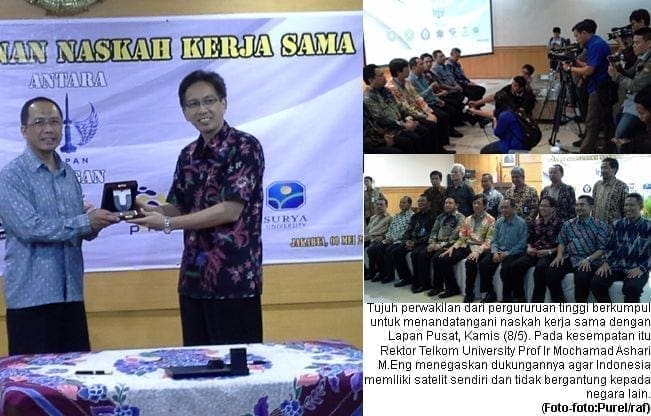JAKARTA, TEL-U – Telkom University rector, Prof. Ir. MochammadAshari, M.Eng, PhD firmly confirmed his support for Indonesia to have the satellite themselves in order to be self-sustained without dependency to the other country. He said his support during the press conference inheadquarter of National Institute of Aeronautics and Space of Indonesia (Lapan), in Jakarta, Thursday (8/5).
“Mastery in satellite is one of the focuses of our research that is currently developed by our researcher, Nano satellite as an example. We hope that this kind of research could be developed along with Lapan in order to achieve an autonomy in the field of satellite,” said the rector accompanied by the Head of Lapan main headquarter Prof. Dr. Thomas Djamaluddin along with the chair and representatives from six other universities.
On Thursday, seven representatives from the universities gather to sign the cooperation agreement with Lapan. Besides Telkom University rector, also attend the ceremony was the representatives from GadjahMada University (UGM), Padjadjaran University (Unpad) Bandung, Diponegoro University (Undip) Semarang, PENS Surabaya, Nusa Cendana University East Nusa Tenggara and Surya University.
According to the head of Lapan main headquarter, Prof. Dr. Thomas Djamaluddin, aerospace nowadays is similar with the information technology. “If one country could develop a satellite themselves, it would be a strong advantage for them. This could be the challenge to develop the satellite; hence we need to cooperate with the universities to accomplish the mission. We wanted in the next 25 years, we finally be able to create an operational satellite by ourselves,” said Thomas. He addedLapan currently is working on the development of four major aspects; those are competency development, public service development, national and international cooperation strengthening and human resource development.
Talking about the human resource development, Thomas wanted that Lapan researcher would have a better qualification. One way to do that is by sending the resources to complete an education level including bachelor, master and post doctorate degree. Because, according to him currently there are a lot of obstacles for the human resource development. “Sometimes, when the sponsorship is available, the current resources are not available. As an implication, we need to do on a batch per batch basis, thus it becomes less effective. Because of that, a breakthrough is needed, like this cooperation for example,” said Thomas. (Purel/rdz)

